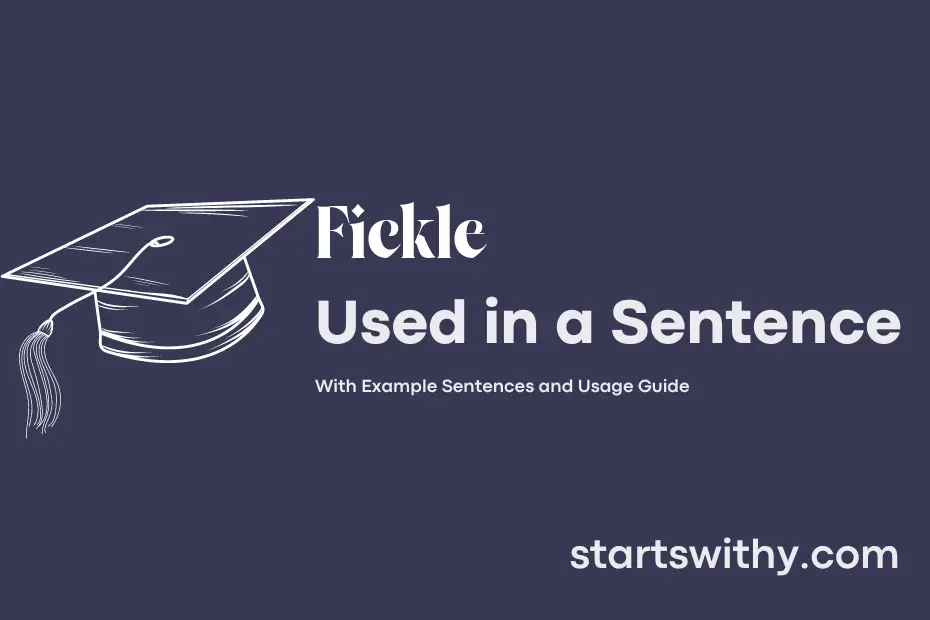Do you ever find yourself struggling to make up your mind? The word “fickle” is used to describe someone who frequently changes their opinions or desires. This adjective is often applied to people who have a hard time sticking with one choice or commitment.
7 Examples Of Fickle Used In a Sentence For Kids
- The weather in summer can be fickle.
- My cat’s mood is sometimes fickle.
- Flowers can be fickle and change colors.
- Some days, my brother’s favorite color is fickle.
- The wind can be fickle and change direction.
- The taste of ice cream can be fickle for some people.
- Fickle clouds can move quickly across the sky.
14 Sentences with Fickle Examples
- Fickle attendance policies can make it difficult to maintain a good academic record in college.
- Balancing studies and social life can be challenging when dealing with the fickle nature of friendships.
- It’s important to stay focused even when facing fickle internet connectivity during online classes.
- College students often struggle with fickle sleeping patterns due to erratic schedules.
- Managing finances can become tricky when dealing with the fickle costs of living in a college town.
- Fickle weather conditions can make commuting to college a daily uncertainty.
- Choosing a major can be a fickle decision for many college students, leading to changes later on.
- The fickle job market can add stress to the already overwhelming task of finding internships in college.
- It’s important to remain adaptable in the face of fickle assignment deadlines and project requirements.
- Fickle group dynamics can make group projects a challenging experience for college students.
- Juggling extracurricular activities and academics can be made more difficult by the fickle scheduling conflicts that arise.
- College relationships can be fickle as students navigate new social circles and interests.
- Keeping up with trends in fashion and technology can be exhausting due to their fickle nature.
- Students often find themselves torn between following their passions and choosing a more fickle career path for financial stability.
How To Use Fickle in Sentences?
Fickle is used to describe someone or something that is not stable or constant in their decisions, actions, or feelings. When using the word fickle in a sentence, you can convey the idea that the person or thing being described is unpredictable or likely to change their mind frequently.
For example, you could say, “She is known for her fickle nature, one day she loves a certain band and the next day she hates them.” In this sentence, the word fickle is used to show that the person changes their opinion quickly and without warning.
Another way to use fickle in a sentence is, “The weather was fickle today, it started sunny but suddenly turned stormy.” Here, fickle is used to describe the unpredictable nature of the weather.
Remember that when using the word fickle, it is important to provide context so that the reader or listener can understand how the word is being used in the sentence. By using fickle in your writing or speech, you can add nuance and depth to your description of people or situations that are characterized by instability or unpredictability.
Conclusion
In conclusion, the concept of being fickle refers to a person’s tendency to change their mind frequently or act in an unpredictable manner. The examples of sentences with the keyword “fickle” highlighted how individuals can be inconsistent or unreliable in their decisions, making it challenging to trust or rely on them. People labeled as fickle may struggle to commit or stick to a particular choice, leading to confusion and frustration for those around them.
Understanding the nature of fickleness can help in navigating relationships and interactions with such individuals. Recognizing and accepting the fickle tendencies of others can help manage expectations and prevent disappointment. By acknowledging and adapting to the fickle behaviors of individuals, one can foster better communication and minimize the impact of their unpredictability on personal and professional relationships.



